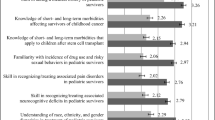Abstract
Introduction
Oncology health care professionals frequently lack the background to implement needed survivorship activities and follow-up care. The purpose of this project is to assist providers in the clarification and initiation of potentially durable changes in survivorship care by developing a health professional curriculum, recruiting participants, implementing the course, conducting course evaluation and following participants’ defined goals over time.
Materials and methods
The curriculum was developed based on recommendations from the Institute of Medicine Report-From Cancer Patient to Cancer Survivor—Lost in Transition. Three concepts were used to structure the course: cancer survivorship quality of life, changing practice via performance improvement, and principles of adult education. Expert faculty designed and implemented the curriculum and teaching methods using adult learning principles and an interactive approach. Competitively-selected, two-person interdisciplinary teams for the first course (July 12–15, 2006, Pasadena, California) were selected based on stated interests, three projected goals, and letters of commitment from administrators.
Results
Participants represented 52 cancer care settings from 28 states. Teams included Nurses (48.1%), Social Workers (20.7%), Physicians (18.8%), Directors/Administrators (6.6%), Psychologists (2.8%), and others (3%). The institutional barriers identified by teams were lack of survivorship knowledge (94 %), financial constraints (61%), lack of administrative support (6%), and staff philosophy that excluded survivorship (15%). Evaluation of content from the first course was consistently positive.
Conclusions
Dissemination of survivorship education for health care professionals stimulates participants to define and begin to implement goals for improving survivors’ care.
Implications for cancer survivors
A training program such as the one described provides professional knowledge regarding survivorship that has the potential to facilitate change in the health care that cancer survivors receive thus ideally improving long term health and well being.





Similar content being viewed by others
References
Estimated U.S. Cancer Prevalence. [online]. Available: http://cancercontrol.cancer.gov/ocs/prevalence/prevalence.html [accessed December 17, 2006].
National Coalition for Cancer Survivorship (1999). Turning Hope into Action. Silver Spring, MD, National Coalition for Cancer Survivorship.
National Coalition for Cancer Survivorship (2006). Pioneering Survivorship—20 years of advocating for quality cancer care. http://www.canceradvocacy.org.
About Survivorship Research: Survivorship Definitions. [online]. Available: http://dccps.nci.nih.gov/ocs/definitions.html [accessed December 17, 2006].
Committee on Cancer Survivorship: Improving Care and Quality of Life. National Cancer Policy Board. (2006) From cancer patient to cancer survivor—lost in transition. Washington, D.C: The National Academies Press http://www.nap.edu).
Ferris, F., Von Gunten, C., Emanuel. (2001). Office of Cancer Survivorship. http://www.psycho-oncology.net/Bethesda.html
Ferrell, B., Grant, M., Borneman, T., Juarez, G., & Virani, R. (2002). Strategies for effective continuing education by oncology nurses. Oncology Nursing Foundation, 29(6), 907–909.
Rogers, E. (1962). Diffusion of innovations. New York: The Free Press.
Ferrell, B., Virani, R., Grant, M., Rhome, A., Malloy, P., Bednash, G., & Grimm, M. (2005). Evaluation of the End-of-Life Nursing Consortium undergraduate faculty training progam. Journal of Palliative Medicine, 8(1), 107–114.
NCI Grant (2006) IR25-CA107109-01 Survivorship Education for Quality Cancer Care.
Clark, E. J., Stovall, E. L., Leigh, S., Siu, A. L., Austin, D. K., & Rowland, J. H. (1996). Imperatives for Quality Cancer Care: Access, Advocacy, Action, and Accountability. National Coalition of Cancer Survivorship, 7–8.
Walrath, J. M., Mugan;inskaya, N., Shepherd, M., Award, M., Reuland, C., Makary, M. A., et al. (2006). Interdisciplinary medical, nursing, and administrator education in practice: the Johns Hopkins experience. Academic Medicine, 81(8), 744–748.
Grant, M., Rivera, L., Alisangco, J., & Francisco, L. (1999). Improving cancer pain management using a performance improvement framework. Journal of Nursing Care Quality, 13(4), 60–72.
Ferrell, B. R., & Virani, R. (1998). Institutional commitment to improved pain management: Sustaining the effort. Journal of Pharmaceutical Care in Pain & Symptom Control, 6(2), 43–55.
Ferrell, B. R., Dean, G. E., Grant, M., & Coluzzi, P. (1995). An institutional commitment to pain management. Journal of Clinical Oncology, 13, 2158–2165.
Grant, M., Hanson, J., Mullan, P., Spolum, M., & Ferrell, B. Disseminating End-of-Life Education to cancer centers: Program review and evaluation (Submitted 2006)
Bransford, J. D., Brown, A. L., & Cocking, R. R. (2000). Principles adapted from National Research Council—“How People Learn” Brian, Mind, Experience and School. Washington DC: National Academy Press.
Knowles, M. S. (1973). The adult learner. A neglected species. Houston, TX: Gulf Publishing.
Sullivan, A. M., Lakoma, M. D., Billings, J. A., Peters, A. S., Block, S. D., & the PCEP Core Faculty. (2006). Creating Enduring Change-Demonstrating the Long-Term Impact of a Faculty Development Program in Palliative Care. Journal of General Internal Medicine, 21, 907–914.
http://www.lillyoncology.com/oncology_canvas/2006_index.jsp [accessed December 18, 2006].
Survivorship Education for Quality Cancer Care Newsletter. 2006 September.
Acknowledgement
Funding Source–National Cancer Institute. 1-R25-CA 107109-01 Survivorship Education for Quality Cancer Care
Author information
Authors and Affiliations
Corresponding author
Rights and permissions
About this article
Cite this article
Grant, M., Economou, D., Ferrell, B. et al. Preparing professional staff to care for cancer survivors. J Cancer Surviv 1, 98–106 (2007). https://doi.org/10.1007/s11764-007-0008-z
Published:
Issue Date:
DOI: https://doi.org/10.1007/s11764-007-0008-z




